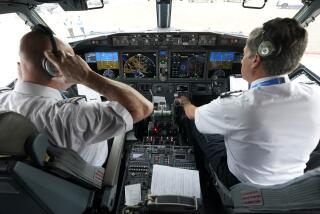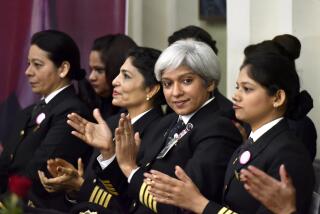Retired Pilots Die Earlier Than Most, Study Says : Workplace: A global survey of fliers will look at why longevity figures for the pilots seem to be worse than for the rest of the population.
- Share via
NEW YORK — Sixty percent of 282 retired airline pilots included in a recent study died within five years of leaving their jobs, according to an international pilots organization.
Officials of the International Federation of Air Line Pilots Assns., which met in Washington this week, refused to speculate on the reasons for the large proportion of untimely deaths but said they have begun a worldwide study of the matter. The group represents about 700,000 pilots in 69 member organizations, mostly pilots unions.
Mike M. Clarke, a pilot for British Airways and a vice president of the group, said he had based the initial study on pilot retirement records spanning the period 1953 to mid-1988. He said he had received little or no cooperation from the airlines.
Clarke said: “I told the pilots at the meeting (in Washington) that 60% of them would not be around when they were 65 years old. I told them that was what the current figures told us,” he said in an interview this week. The longevity figures for the pilots are markedly worse than for the rest of the population.
According to the National Center for Health Statistics, the overall average life expectancy for Americans 60 years old is 20.4 years. At 65 it is 14.7 years for men and 18.6 years for women.
Even though the original study--conducted by Clarke in Britain, Canada and Argentina--involved only the 282 pilots, the findings were surprising.
For one thing, Clarke said, pilots must undergo complete physical examinations before they begin work and subsequently must take physicals twice a year. Thus, if they have any illness, it is found much sooner than it is among the general public. Moreover, airline pilots retire at age 60 or earlier.
“Perhaps we should all be concerned that our profession, which demands such stringent mental and physical requirements for entry, does not appear, in spite of frequent medical checks throughout our careers, to enjoy life expectancy that could reasonably be expected from such an excellent starting position,” Clarke said in a letter to member organizations.
“Do we work too hard? Are the stress levels in aviation too high? Do pilots smoke and drink too much and exercise too little?”
Clarke conceded that 282 pilots is only a small sample but added, “Pilots are a very small segment of the population.”
Though there has been continued controversy in this country about the early retirement age for airline pilots, some other countries have even lower retirement ages. Retirement for pilots of British Airways, for example, is 55, and most other European airlines ground pilots at between 57 and 60. Nowhere in the world do airline pilots fly past the age of 60.
Robert Buckhorn, a spokesman for the Federal Aviation Administration, said the controversy “has been going on for decades” but the rule has been unchanged since 1959.
“It is an arbitrary rule,” he said. “We don’t have a vast amount of data.” He said efforts by senior pilots to extend their flying years if they are in good health have been rejected by the courts.
The IFALPA study has been mailed to its member organizations, which will distribute and collect them from their members. When all of them have been returned and that is expected in June, they will be analyzed independently by the British Royal Air Force Institute of Aviation, which also helped write them. The group hopes to get 70,000 responses.
The survey, which will be anonymous, asks 47 questions of pilots, including the kind of planes flown, the pilot’s age, sex, rank and whether the flights are long haul or short haul. The pilots are also asked how well they sleep away from home, whether they take medication to sleep, how they feel at the end of a flight, whether they smoke, drink or take drugs and if so how much. Questions also ask if they have had certain diseases and how their flying career has affected their sex lives.
Denise Loftus, manager of work force education of the worker equity department of the American Assn. of Retired Persons, said: “It is a well-known truism that people who have not prepared for retirement will not survive for long. Pilots have a single focus in their lives--flying. Take that away and they don’t have anything to replace the sense of who they are.”
She said some pilots “do make sure that they other interests such as businesses or special hobbies that can take up the slack when they leave flying so they are not out on a cliff.”
More to Read
Inside the business of entertainment
The Wide Shot brings you news, analysis and insights on everything from streaming wars to production — and what it all means for the future.
You may occasionally receive promotional content from the Los Angeles Times.










